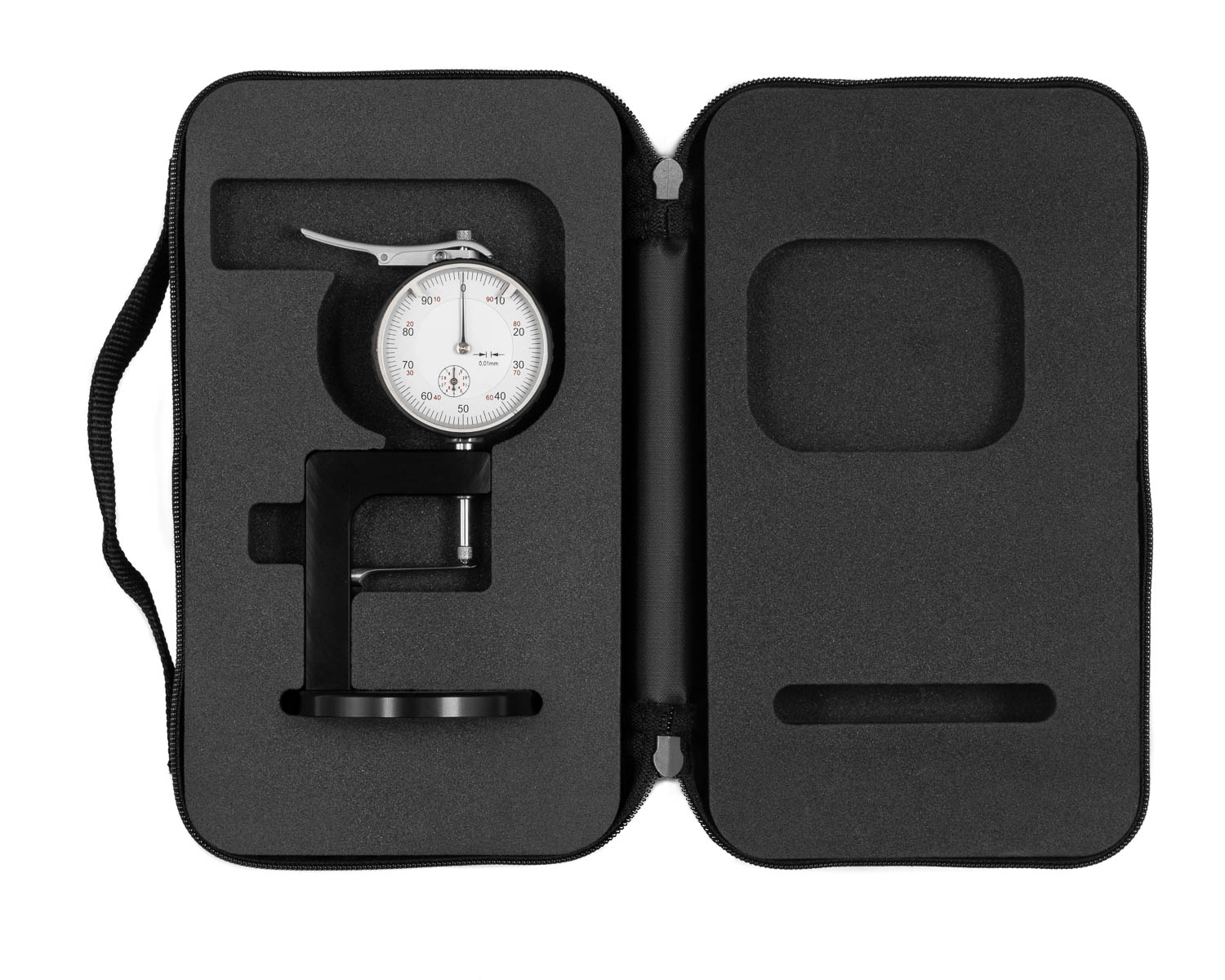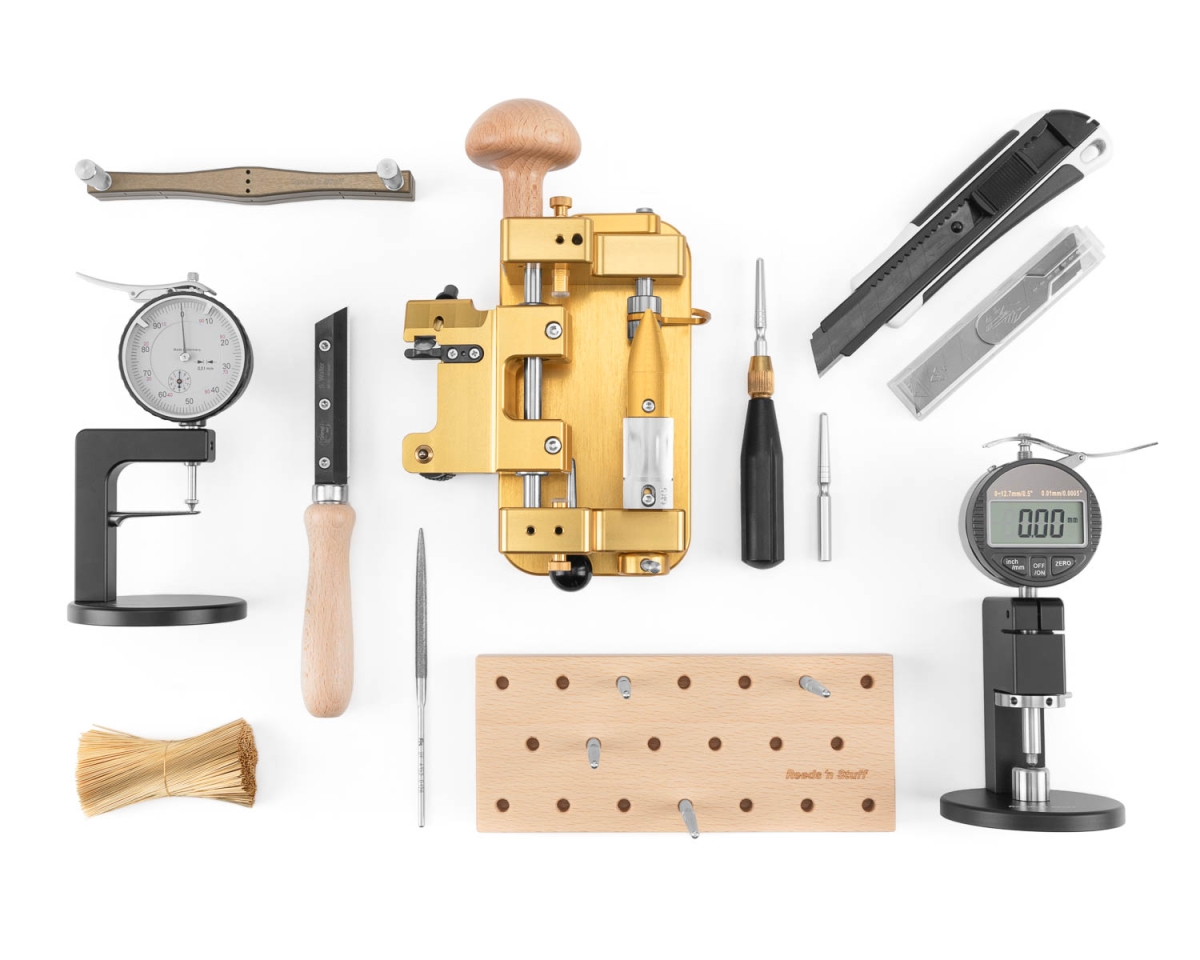Quality and Control
Precision, durability, and reliability characterize Reeds 'n Stuff dial indicators.
Achieve consistently good results by measuring the thickness of your cane.
The markings on the tongue help to determine identical measuring points between reeds, which allows you to check the profile and symmetry of the reeds.
The space-saving mini dial indicator is the ideal choice for precise measuring on the road.
The dial and the lifting lever can be rotated to any desired position.
The dial indicator is therefore suitable for both right-handed and left-handed people.
Our dial indicators are available in both analog or digital formats.
The precision of both devices is the identical, the only difference lies in the convenience of use.

The Tip of Your Choice
Choose among tips S (Standard for bassoon and the mini dial indicator), F, and D to see the point you are measuring from every perspective and to measure exactly at a given point. Choose the ball-pointed tip K for a smooth glide when you pull the cane or reed through, as well as to measure gouged cane.
-
-

-
The Reeds 'n Stuff transport case features a simple design that's easy to use. The foam interior provides a snug fit for safe transportation. Tools can be stored in the zippered compartment on top of the case. The handle provides portability wherever you need it.
Buy
-
The easiest way is to turn the dial so that the large pointer is back at ZERO. However, the dial indicator can also be recalibrated so that the large pointer is back at 12 o'clock. To do this, loosen the fastening screw that fixes the dial indicator in the dial indicator arm. Now position the dial indicator by moving it up or down so that both the small and large pointer show ZERO. When locking the screw do not tighten it too much, as this can block the axle movement in the dial indicator.
Can I change the tip of the dial indicator?Replacing the tip of the dial indicator is easy to do. You can simply turn out the tip that you have now with the help of pliers and replace it with the desired new tip. If there is not enough space between the tongue and the tip, you can loosen the screw that fixes the dial gauge in the dial gauge arm and remove the dial gauge from the arm. It may now be necessary to recalibrate the dial indicator.
Can I change the tongue of the dial indicator?The tongue of the dial gauge can also be changed very easily. You can find instructions here.
Can the hardness tester be used as a dial indicator?The support plate of the hardness tester is too large to obtain precise results. The thickness of finished reeds, for example, cannot be measured with the hardness tester. Inaccurate measurement results may occur also with gouged cane. For this reasons we do not recommend using the hardness tester as a dial indicator.
Can I transform my dial indicator from right to left-handed or do I need to buy a new one?The dial indicator can easily be transformed from right to left-handed. Simply loosen the set screw at the end of the arm holding the dial. This will allow you to rotate the dial to face the opposite direction. Be sure to calibrate the height of the dial so it both touches the tongue and reads "0" before tightening the set screw. Make sure not over-tighten this screw as it will damage the actuating shaft and prevent the dial from operating properly.
- Manufacturer
- Reeds 'n Stuff
Matching Products
Yumi Deger
Bassoonist Yumi Deger (born Matsumoto) learned reed making at the age of 15 from her first teacher Masayuki Okamoto (Principal Bassoonist, Tokyo Metropolitan Symphony Orchestra and Professor, Tokyo University of Fine Arts). She has studied with Motoko Kawamura (Principal Bassoonist, New Japan Philharmonic Orchestra), Georg Klütsch (Professor, Hochschule für Musik und Tanz Köln), Valentino Zucchiatti (Principal Bassoonist, Teatro alla Scala), and Ulrich Hermann (Professor, Hochschule für Musik und Tanz Köln, previously Universität Mainz).
Through her skilfull selection of cane and fine reedwork she has become a sought-after reed maker among professors, soloists, orchestra musicians, and students. After many years of experience in the production of high-quality reeds, YUUMI REEDS has many high-profile regular customers in orchestras such as Gürzenich Orchester Köln, WDR Sinfonie Orchester, Tonhalle Zurich, Rotterdam Philharmonie Orchestra, and Theater Hannover.
Yumi Deger is popular as a substitute bassoonist in internationally renowned orchestras, teaches at several music schools (Musikschule der Stadt Düsseldorf, der Stadt Bonn, and der Stadt Köln), and is the bassoon reed making instructor at the Hochschule für Musik und Tanz Köln.
More InformationThe following collection of tools was put together with Yumi. They are the tools she herself uses to make reeds.
"The most important thing bassoonists should know about reed making is how to sort cane and which combination of brand, density, and hardness best suits them and their own bassoon."
Cane selection is of the utmost importance to Yumi's reed making process.
The first steps in her process are to split the tubes, soak them, cut them to length, and pregouge them. After letting the cane dry for several days Yumi will measure the cane for density and sort them into categories to become different types of reeds.
Based on the density and hardness Yumi will then gouge the cane to different thicknesses, to achieve the specific result she is aiming to get out of that particular piece of cane. During the gouging process she regularly measures the cane to ensure she achieves exactly the desired hardness and gouge thickness. This cane is then shaped on a R1A shape and profiled.
After scoring the tubes and folding the cane in half, Yumi will place the 0.6 mm brass wires. The blanks are left on the mandrel in a drying board until they are fully dried. Once the blanks are ready, and wrapped, she clips the blades to a length of 28 mm, then processes the blank with a GR5 template on the tip profiling machine.
After some careful adjustments with a file, 320-grit sandpaper, and a knife the reeds are sent out to the delight of bassoonists all over the world.
Reeds 'n Stuff regularly hosts reed making classes in conjunction with Yumi. If you want to learn the secrets to her cane sorting process and how she does the final reed adjustment, reach out to Yumi or be on the lookout for our next classes with her.
-

-
Reed Making Set YUMI
Buy
